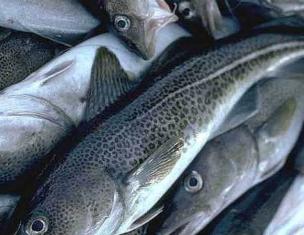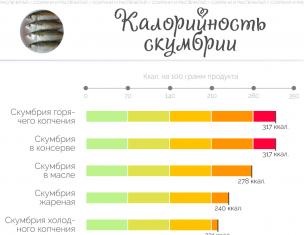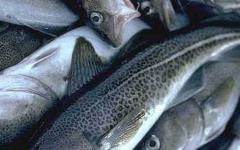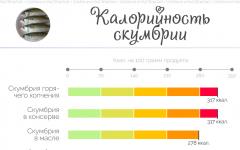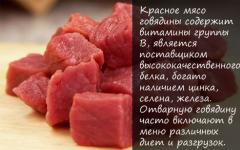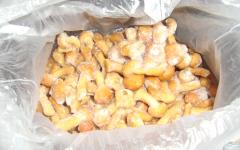Calorie content of mackerel: 200 kcal.*
* average value per 100 grams, depends on the method of preparation and type
Mackerel is a valuable commercial fish, distinguished by its pleasant taste and tender meat. It is affordable, nutritious and has a number of valuable properties.
Nutritional value of mackerel
The calorie content of fresh mackerel of different types reaches 200 kcal, which is quite a high figure. However, fish is rich in microelements, vitamins, and most importantly, unsaturated fatty acids. About 100 g of product can satisfy half the daily protein requirement. Thanks to the high phosphorus content, the condition of teeth and nails significantly improves.
The share of fat is about 17%, protein – no more than 18%.
The product is recommended for people with different forms of diabetes. The benefits of frequent consumption of this fish are reduced due to the rather high fat content. This figure varies depending on what season it was caught. The spring catch is considered the most nutritious, while in the fall the fat content reaches more than 30% of the total weight of the fish.
Calories in boiled, smoked, baked fish
The method of preparing the product largely determines the calorie content. Fried mackerel is not recommended for people following a healthy diet (220-260 kcal per 100 grams). In addition, it is harmful to eat hot and cold smoked mackerel with a calorie content of 220 to 300 kcal. All these cooking methods significantly increase the fat content of the product.
It is healthy to eat boiled, baked and steamed mackerel (221, 195 and 191 kcal, respectively).
If the fish was salted at home without adding harmful ingredients, sugar and oil, as is done in mass production, then the energy value compared to the fresh product will practically not change - from 150 to 190 kcal.
Mackerel calorie table per 100 grams
You can see what the energy value of a popular product is, and how it changes depending on different methods of heat treatment, using the table we prepared.

Is it possible to use mackerel in diets?
The energy value will increase when adding fatty sour cream, mayonnaise or other sauces. You won’t be able to enjoy the fried product while on a diet – one serving will cost more than 240 kcal. The best option is cooking on a grill or grill pan without oil (178 kcal).
By including the product in question in moderate quantities on the menu, you can replenish the lack of nutrients in the body and recharge your energy for the whole day. With the right cooking method, you don’t have to worry about gaining extra pounds.
Mackerel is a member of the mackerel family. This is a heat-loving, schooling fish that can reach a length of up to 60 centimeters. Mackerel has an elongated body that is covered with small scales.
As a rule, mackerel gather in schools, and there are no fish of other species in schools. The optimal temperature for fish is from 8 to 20 degrees. During winter, the fish goes to a depth of up to 250 meters, where it leads a sedentary lifestyle, and in the spring it moves closer to the shores. The average lifespan of mackerel reaches 15-18 years.
Delicious mackerel dishes are often found on Russian tables. Both adults and children love her. But what is the nutritional value of mackerel and how high-calorie this fish is, you can find out from this article. And also below will be presented several delicious recipes for preparing this fish.
Chemical composition
The chemical composition of mackerel contains a huge amount of substances vital for the human body. The benefits of this fish are ensured by the fact that it contains the following elements:
- vitamins of group B, A, C;
- selenium;
- calcium;
- sodium;
- magnesium;
- fluorine;
- nickel;
- molybdenum;
- cobalt;
- phosphorus;
- iron;
- potassium;
- zinc;
- copper;
- manganese.
It is important to note that by consuming just 100 grams of this fish during the day, you can ensure that your body is full:
- selenium - 93.8% of the daily norm;
- phosphorus - by 39.7% of the daily norm;
- vitamin B12 - 791.7% of the daily requirement.
The nutritional value of 100 grams of mackerel is:
- 18 grams of protein;
- 13.2 grams fat;
- 0 grams of carbohydrates;
- 0 grams of dietary fiber;
- 67.5 grams of water.
Benefits of mackerel
This fish is enriched with Omega-3 acid, which can improve immunity and improve metabolism. Therefore, mackerel should be a mandatory product in the diet of children, people suffering from cardiovascular diseases, pregnant and lactating girls.

The protein contained in mackerel is absorbed three times faster than, for example, beef. It is also important that just 100 grams of mackerel contains half of the daily requirement for the average person.
When consuming mackerel, the level of oxygen in the cells increases, due to which all internal organs are enriched with it, and the fish also helps to launch regeneration processes in the mucous membranes and skin.
Fish oil allows you to dilate the blood vessels of the heart muscle, thereby reducing the risk of blood clots. With regular use, bones and teeth are strengthened and immunity is increased.
All the substances found in fish help ensure the normal functioning of cells, overcome harmful bacteria and establish the water-salt balance in the body. It is important that this fish does not need to be consumed in large quantities; you just need to introduce several servings of stewed or boiled mackerel into your weekly diet, and the benefits for the body will be noticeable after a few weeks.
Calorie content of fish
During the cooking process, the calorie content of the product depends on the type of heat treatment. The table below will show in detail what the calorie content of mackerel will be per 100 grams in boiled, fried, stewed and other types of preparation.
| Cooking method | Calorie content per 100 g (kcal) | Carbohydrates (g) |
||
| Baked mackerel (no oil) | ||||
| Baked mackerel in foil with tomatoes (no oil) | ||||
| Fried mackerel (in oil) | 0 | |||
| Stewed mackerel in sour cream with onions and carrots | ||||
| Cold smoked mackerel | ||||
| Hot smoked mackerel | ||||
| Boiled mackerel | ||||
| Lightly salted mackerel | ||||
| Dried mackerel | ||||
| Grilled mackerel | ||||
| Marinated mackerel |
Once you know the calorie content of mackerel per 100 grams, you can easily understand in what form this fish is most nutritious. From the presented data it is clear that hot smoked mackerel will have the most calories. But from eating this fish in stewed or pickled form, the body will receive fewer calories.
Having understood what nutritional value mackerel provides the body and what health benefits it can bring, you can begin to consider the simplest and most delicious recipes.
Fried mackerel in vegetable oil: a simple recipe
First you need to prepare the fish. Fresh mackerel should be cleaned and washed in water.
Next, the fish is cut into equal pieces and breaded in flour with the addition of a small amount of salt. Pour a little vegetable oil into a heated frying pan (you can use either sunflower or olive oil). Next, the fish is placed in a frying pan and fried on both sides. You can serve fried mackerel with any favorite side dish.

Stewed mackerel in sour cream: recipe
Using this oven-baked recipe, quickly and deliciously prepared, you can feed your household. At the same time, this dish will not only help saturate the body and satisfy hunger, but will also bring benefits.
First you need to prepare the ingredients, namely:
- mackerel - 1 pc.;
- potatoes - 500 g;
- carrots - 100 g;
- onions - 2 pcs.;
- tomatoes - 2 pcs.;
- sour cream (15% fat) - 100 g;
- herbs, salt, vegetable oil, spices - to taste.
The mackerel is cleaned and cut into small pieces. Vegetables should also be peeled, washed thoroughly under water and cut. Next, you need to lay out the ingredients in layers in a fireproof form, greased with vegetable oil:
- 1st layer - potatoes;
- 2nd layer - fish;
- 3rd layer - onions and carrots;
- 4th layer - tomatoes;
- 5th layer - greens.
Each layer needs a little salt. Then add sour cream to the pan and place it in the oven for 30 minutes. Cooking mackerel in the oven is quick and tasty. The dish can be served without additional side dish.

Cooking mackerel in a slow cooker: recipe
Having a multicooker makes preparing any dish much easier. In the case of this fish, you should first pour a little water into the bottom of the bowl. Next, you need to clean the fish, cut it and salt it. Cover a special container for steaming with food foil and place the mackerel in it. Next, put a little onion, cut into half rings, and a few slices of lemon on top of the fish.
Cook the fish in the “Steam” mode for 25-30 minutes. This fish will be useful for both children and adults.
Harm to mackerel
For a healthy body, this fish cannot cause any harm. However, it should be remembered that if you have diseases such as kidney failure, hypertension, pancreatitis or cholecystitis, mackerel should not be consumed salted or smoked.

If you have problems with the gastrointestinal tract, you need to exclude this fish from your diet. In some cases, it is permissible to consume mackerel only in boiled form. However, it is worth remembering that high fat content can lead to unpleasant consequences. Therefore, you should discuss with your doctor the inclusion of this product in your diet.
Conclusion
Having considered the nutritional value of mackerel, its benefits for the body and calorie content, we can conclude that this fish is unique and irreplaceable for humans. Its use can have a positive effect on health, strengthen the immune system and vital systems.

Knowing what to cook from mackerel, you can delight yourself and your loved ones with delicious and very healthy dishes. Anyone can use the above recipes and easily bring them to life.
The second name for mackerel is mackerel. Most people classify this fish as a fatty fish, and therefore consider it not very healthy. Naturally, the calorie content of mackerel is quite high, because... and its fat content is high. But above all, this fish has great benefits for humans.
Mackerel fat is processed by the human body much faster than fat of animal origin. In addition, it contains a large amount of polyunsaturated fatty acids necessary for general well-being, health and beauty of our skin, mucous membranes, joints, blood vessels and hair. Therefore, refusing to include this fish in your diet is, to say the least, reckless.
Composition and calorie content of mackerel
Mackerel is a fatty fish. 100 g contains from 13 to 30 g of fat; water 68 g; proteins -18g, unsaturated fatty acids -70g.
Mackerel meat, as well as all other types of marine commercial fish, is rich in vitamins, macro and microelements. This fish can be safely called an excellent multivitamin complex, given to us by nature itself. Mackerel meat contains vitamins B, A, C, D, H, PP, K. In addition to its high calorie content, mackerel is rich in macro- and microelements necessary for the normal functioning of the human body:
- Phosphorus;
- Potassium;
- Calcium;
- Magnesium;
- Sodium;
- Iron;
- Zinc;
- Fluorine;
- Copper;
- Manganese;
- Cobalt, chromium, nickel, mobile.
Just 300.0 grams of mackerel fillet can fully provide an adult with the daily requirement of phosphorus. And 400.0 grams of meat from this fish 100% covers the need for such a necessary chemical element as potassium.
How many calories are in mackerel?
The chemical composition of mackerel is influenced by various factors: age, place where it was caught, time, etc. Fish caught in northern latitudes is very fatty. Sometimes the fat content in it reaches 30%. Therefore, the calorie content of mackerel in this case will be very high. And in other cases, its fat content is two times lower, therefore, mackerel will contain fewer calories.
The calorie content of Atlantic medium fat mackerel per 100g is approximately 200 kcal. The calorie content of mackerel can change in one direction or another by an average of 50 kcal. This is primarily affected by its fat content.
Useful properties of mackerel
Unfortunately, in the cuisine of our country and in the vast majority of other CIS countries, mackerel is not particularly widespread. As can be seen from the composition, it is rich in vitamins, microelements and unsaturated fatty acids that are beneficial for the human body. Moreover, the content of nutrients in it is quite high, but the calorie content of mackerel, due to its high fat content, is also not low.
There is no need to tell anyone about the benefits of fish oil. Mackerel is its natural source. Moreover, when eating the meat of this fish, such an unpleasant taste of fish oil, which many remember from childhood, is absolutely not felt. Fish oil protects cells from free radicals and also strengthens cell membranes. All this is an excellent prevention of various oncological diseases.
 Fish is recommended to be consumed not only by adults, but also by children, despite the high calorie content in mackerel. In the CIS countries, they are mostly accustomed to eating salted or smoked mackerel, and this is not very healthy.
Fish is recommended to be consumed not only by adults, but also by children, despite the high calorie content in mackerel. In the CIS countries, they are mostly accustomed to eating salted or smoked mackerel, and this is not very healthy.
There are a huge number of recipes for cooking mackerel. For children, you can put it out. One of the advantages of this fish is the absence of small bones in its meat. It perfectly provides the body with phosphorus, calcium, iodine, fat-soluble vitamins and polyunsaturated fatty acids.
So how many calories are in mackerel? The answer to this question will depend not only on its fat content, but also on the method of preparation. The more oil is used when preparing a dish, the higher the calorie content of mackerel will be.
Salted and smoked mackerel is not recommended for consumption by people with diseases of the gastrointestinal tract, kidneys and cardiovascular system. Particularly fatty varieties, regardless of the method of preparation, should be excluded from the diet of people with liver and biliary tract diseases. And, of course, due to its high calorie content, mackerel should not be included in the menu of obese people. In other cases, there are no contraindications for its use.
4.1 out of 5Mackerel is the closest relative of perch. In many countries, mackerel is commonly called mackerel.
You've probably heard that fish is healthier the fattier it is, the more polyunsaturated fatty acids it contains, which are so necessary for our body, in particular Omega-3 acids. Mackerel is an oily fish. Fats in its composition have a share reaching 30%. Protein content is about 18%. But mackerel proteins and fats are easily and quickly absorbed by the body. The high content of Omega-3 acid allows you to effectively resist atherosclerosis and support the immune system. The rich content of vitamins and minerals has a beneficial effect on all body systems, without exception. And in terms of calorie content, mackerel can be compared to beef. The only difference is that fish proteins and fats are much more valuable, as they are easier to digest.
How many calories are in mackerel
The calorie content of mackerel depends on the time of year and where the fish are caught. The colder the water, the more fat the mackerel contains, the more calories there are in the mackerel. The fattest, most delicious mackerel is caught in the northern latitudes, in winter. It is winter fish caught in the northern seas that will have the maximum fat content - about 30%. Fish caught in more southern latitudes in the spring-autumn period has less fat. But this figure does not fall below 13%.
The calorie content of mackerel, depending on the season and place of catch, can vary significantly. It is generally accepted that the calorie content of mackerel ranges from 150 to 200 kcal. Of course, such a significant discrepancy creates some difficulties for those who strictly consider the number of calories in food. In this case, you can use the average and assume that the calorie content of mackerel is 175 kcal.
Calorie content of mackerel after cooking

The above figures were related to the calorie content of fresh mackerel (fillets). But during the cooking process, the energy value of fish can change significantly.
Smoked mackerel is very popular. Mackerel prepared in this way contains a significant amount of calories: about 220-225 kcal. Proteins will be 20-21%, fats – 15-16%.
Mackerel is also popular in salted form. Its energy value in this case is maximum. How many calories are in salted mackerel? As much as 300, and sometimes all 315 kcal. But all the beneficial substances of mackerel are almost completely preserved, of which this delicious fish contains a lot.
Smoked and salted mackerel cannot be classified as a dietary dish. Firstly, due to the high calorie content of mackerel prepared using these methods, and secondly, due to the high salt content in fish, which, as is known, is unacceptable in dietary nutrition.
Boiled or steamed fish is suitable for dietary nutrition. From the point of view of preserving nutrients, it is worth giving preference to steamed dishes. The calorie content of steamed mackerel is about 170 kcal. There are even fewer calories in boiled mackerel - no more than 130 kcal. But there are also fewer valuable substances, since a significant part of them went into the decoction (broth).
Many people love fried mackerel. The calorie content of fried mackerel is about 180-190 kcal. Mackerel baked in the oven is healthier and has slightly lower calorie content. The energy value of the fish in this case will be no more than 175 kcal.
A dish is considered low-calorie if its energy value does not exceed 100 kcal per 100 g of finished product. Mackerel does not fit into this framework. However, this fish can and should be used in diet for weight control. Especially if not only diet, but also physical activity is used to achieve slimness. After all, with a significant calorie content, mackerel supplies the body with easily digestible protein, which is used to build muscle tissue, and valuable fats necessary to strengthen intercellular membranes and vascular walls. Also, mackerel contains many substances that activate metabolism.
Boiled and steamed mackerel, cutlets and soufflé made from it can be included in the menu of patients suffering from stomach and duodenal ulcers. The fairly high calorie content of mackerel will be a great advantage during the recovery period after illnesses and injuries. This fish can and should be included in the diet of athletes.
Contraindications for eating mackerel
It is important to understand that any product is useful if you follow moderation when consuming it. Since the calorie content of mackerel is significant, it should not be abused if you are overweight. Although you shouldn’t completely give up this healthy fish.
Mackerel, being a very fatty fish, should be used with caution by those who have impaired liver and pancreas function. In case of these diseases, smoked and salted mackerel should be completely excluded from the diet. People with kidney disease should do the same.
Definitely, those who are allergic to fish and seafood should avoid mackerel.
Popular articles
Mackerel in our country occupies one of the leading positions in terms of consumption and popularity among the population. In every city in grocery stores you can find cold smoked mackerel, beloved by many. Salted or fresh-frozen fish carcasses, as well as canned mackerel, are in demand.
The abundance of this fish is explained simply - mackerel has a very wide geographical habitat and its population is present almost everywhere in the sea. Schools of this fish are found in the Mediterranean, Black, North and Baltic seas. It migrates in the waters of the Marmara and Barents Seas.
Mackerel is a versatile fish. It is delicious boiled, fried or baked, and simply as a cold snack (salted, smoked, marinated). The relatively low calorie content of mackerel adds a big plus to this fish - it can be used in diets for weight loss (boiled or baked dishes) and in diet menus (1-2 times a week).
Mackerel: calories and nutritional value
Mackerel has great nutritional value due to its rich chemical composition. It contains a large number of vitamins, among which B vitamins, as well as PP, A, C and E, are of particular value. This fish is rich in fluorine, potassium, magnesium, zinc, iron and other macro- and microelements.
Despite its average calorie content, mackerel contains a large amount of fat. Oddly enough, the fat in this product is of very great value, since it plays a vital role for the full functioning of a person. It's all about omega-3 polyunsaturated fatty acids, which are found in abundance in mackerel. These beneficial chemical compounds have a positive effect on the cardiovascular system and are an excellent prevention of atherosclerosis.
The calorie content of mackerel is only 190-200 kcal per 100 g of fish meat. This is a very low figure, given the high fat content of this fish. In fact, the calories in mackerel are not “off the charts,” but the nutritional value is more than high: 100 grams of pulp contains 18 g of protein, 13.2 g of fat and virtually no carbohydrates.
However, the calorie content of raw mackerel is not yet an indicator of the actual calorie content of the product after heat treatment. Indeed, when adding oil or various ingredients, the calories in mackerel can increase significantly.
How many calories are in smoked mackerel?
Smoked mackerel is a favorite product in many post-Soviet countries. Even now, at a time of unprecedented diversity and abundance, herring with thinly sliced cold or hot smoked mackerel is always appropriate on the holiday table.
We must give it its due - smoked mackerel is really very tasty. However, the benefits of eating such fish are very doubtful. And the point here is not at all in the calorie content of mackerel of different types of smoking, but in the process itself. After all, it has long been no secret that fish are “smoked” in our country, as a rule, with the help of chemical reagents. A fish carcass soaked in a solution within a day takes on the appearance, smell and taste close to real smoked fish, but the quality indicators of the counterfeit cannot be compared with the original.
So how many calories are in smoked mackerel? It depends on the type of smoking, the average values look like this:
- Calorie content of cold smoked mackerel is 150-180 kcal per 100 g of finished product;
- The number of calories in hot smoked mackerel is 225-238 kcal/100 g.
Salted mackerel: calorie content and product quality
Salted mackerel is a fairly popular fish appetizer. Some people put lightly salted herring in first place, while others cannot imagine a spiritual feast without spicy salted mackerel. Unlike other types of marine fish, mackerel has fatty, fleshy flesh, which allows you to fully enjoy the excellent taste.
The calorie content of salted mackerel should not differ much from the calorie content of fresh fish. As you know, salt and water do not contain calories, so salted mackerel is not a high-calorie product. However, this is only relevant for mackerel salted according to a standard recipe (the brine includes only salt, water and spices). There are at least 3 types of brine in which fish are soaked. Depending on this, the calorie content of spicy-salted mackerel will be different:
- The calorie content of simple (standard) salted mackerel is 155-161 kcal/100 g;
- Mackerel soaked in brine with added sugar – 175-183 kcal/100 g;
- The calorie content of mackerel salted in a solution with the addition of sugar and vegetable oil is 190-222 kcal/100 g.
What is the calorie content of mackerel in various dishes?
Above we looked at the calorie content of hot and cold smoked mackerel, as well as salted fish. How many calories are in baked or boiled mackerel? After all, you can prepare a lot of tasty and healthy dishes from this wonderful fish. Just look at the hot, tender appetizer of mackerel in tomatoes, baked on the grill. In addition to its excellent taste, this dish also has an undoubted advantage - the calories of mackerel fried in this way remain at the same level (188-190 kcal/100 g).
So, if you want to replenish your body with complete, easily digestible protein and healthy omega-3 acids, eat fried fish. True, fried mackerel has a high calorie content - almost 310 kcal/100 g. Still, the presence of vegetable fat for frying and high-calorie breading made from flour and eggs has an effect.
For those who are struggling with excess weight, boiled mackerel is a dish that meets all the parameters of a dietary product. Having a low calorie content, boiled mackerel, moreover, perfectly satisfies hunger for several hours (this will make it easier to tolerate the diet). How many calories are in boiled mackerel? Not much, only 127 kcal/100 g. This is even less than in raw fish, because when boiled in a large amount of water, the calorie content of mackerel is reduced.
Calorie content of mackerel in dishes with different heat treatments:
- Steamed mackerel – 158-170 kcal/100 g;
- Mackerel baked in foil at home – 220-234 kcal/100 g;
- Mackerel stewed in white wine and champignon sauce – 189-215 kcal/100 g;
- Calorie content of mackerel fried without breading in large pieces – 245-260 kcal/100 g;
- Mackerel baked with onions and spices in a sleeve – 180-195 kcal/100 g;
- Mackerel soup – 139 kcal/100 g.
Despite the higher calorie content of mackerel in stews, you should not neglect them - they enrich the body with valuable nutrients and allow you to diversify your diet. Just remember: you should simmer the fish for no more than 15-20 minutes, otherwise, instead of a healthy dish on the table, you will only have a delicious high-calorie lunch.
Popular articles Read more articles
 02.12.2013
02.12.2013
We all walk a lot during the day. Even if we have a sedentary lifestyle, we still walk - after all, we...
610365 65 More details



